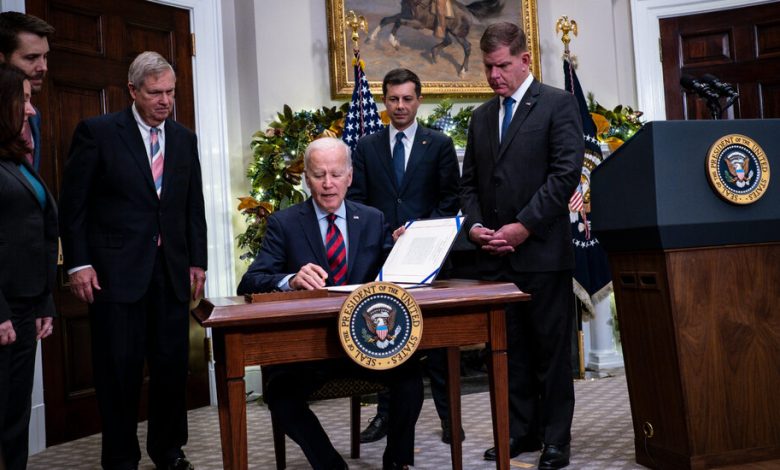Biden Signs Legislation to Avert Nationwide Rail Strike

WASHINGTON — President Biden signed legislation on Friday to impose a labor agreement between rail companies and workers who had been locked in a bitter dispute, averting a strike that could have upended the economy just before the holiday season.
“Without freight rail, many U.S. industries would literally shut down,” Mr. Biden said before signing the bill, adding that many communities would not have received crucial resources during the strike. “Thanks to the bill Congress passed and what I’m about to sign, we spared the country that catastrophe.”
Mr. Biden had called on Congress earlier this week to intervene in the stalemate and avoid the work stoppage that could have cost the economy $2 billion a day. It was a significant move for Mr. Biden, a staunch union backer who has previously argued against congressional intervention in railway labor disputes, arguing that it unfairly interferes with union bargaining efforts.
But he called for an exception in this case because a rail strike could have devastated the economy, snapping supply chains for commodities like lumber, coal and chemicals and delaying deliveries of automobiles and other goods.
The measure forces the companies and their workers to abide by a tentative agreement reached in September, which Mr. Biden helped to broker. That deal includes a 24 percent increase in wages over five years, more schedule flexibility and one additional paid day off. Several rail unions had rejected it because it lacked paid sick leave.
“I know this was a tough vote for members of both parties,” Mr. Biden said. “It was tough for me. But it was the right thing to do at the moment. To save jobs.”
Senate Democrats, under pressure from progressives to insist on the additional compensated time off for workers, tried and failed to push through a House-passed measure to add seven days of paid medical leave to the agreement. It was defeated 52 to 43, failing to secure the necessary 60 votes needed to pass and prompting multiple liberal senators to oppose the agreement altogether.
Congress acted under the Constitution’s commerce clause, which allows it to regulate interstate commerce.
“I know this bill doesn’t have paid sick leave that these rail workers and frankly every worker in America deserves,” Mr. Biden said. “But that fight isn’t over.”
On Thursday, Mr. Biden scoffed at a question over why he helped negotiate an agreement without paid sick leave on Thursday. Last year, an initial social-spending package that failed to pass included a proposal for providing up to 12 weeks of paid sick leave.
“I’m going to continue to fight for paid leave for not only rail workers, but for all American workers,” Mr. Biden said during a joint news conference with President Emmanuel Macron of France.
The tension over the agreement was reflected in Congress in both parties. For Democrats, the failure to add seven days of paid leave for the workers stung. Senate Republicans tried to avoid intervening in the dispute altogether by implementing a cooling-off period of 60 days, but that proposal failed on a 70-25 vote.
